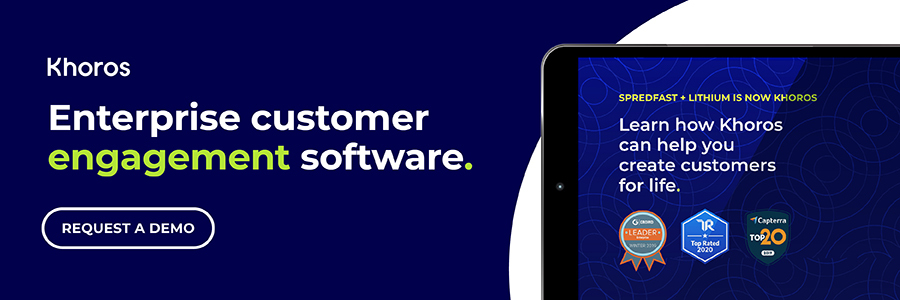 Logo
Logo
EXPERT INSIGHTS
Nov-24-2020
How digital-first customer service propelled the airline industry forward
Khoros Staff
2020 has been extremely tough on airlines.
With reduced passenger volumes and persisting concerns about the health risks of crowded spaces, airlines were heavily impacted by COVID-19. Financial losses in this industry have topped $84 billion.
With people limiting their movement and canceling their travel plans worldwide, airlines had, and are still having to, face questions regarding public health and how to remotely operate a multitude of moving parts, such as shifting flight paths and flight cancellations. Coupled with these concerns are huge spikes in incoming customer service inquiries, as worried customers try to change flights, update travel plans, and even simply ask for information. This means that airlines haven’t just had to overhaul many of their safety and check-in protocols; they’ve also had to almost completely transform how they communicate with customers. How they’ve answered these questions has been industry-defining.
So long, legacy customer engagement practices: The days of brands running on autopilot are over
Over the past decade, more and more brands have adopted digital-first practices for their marketing and customer care. 2020 has accelerated this for at least two reasons: a workforce that has largely had to adjust to remote working, and the difficulty in managing an influx of customer service volume.
A major reason that COVID-19 is forcing customer care teams to evolve is that before the pandemic, companies had not yet invested in technology that could support a high volume of employees working remotely. For airlines, support calls that used to take minutes were taking hours to respond to, as employees weren’t equipped with the technology to provide efficient support. Not only does this create a terrible customer experience, but it’s also miserable for support staff — and that can lead to an increase in agent attrition.
These trends have shown airline executives just how fragile their legacy infrastructures are. The good news, however, is that the fundamental changes airlines are now being forced to make will be better for their business in the long run.
United Airlines is one of the brands leading this trend in modernization. Even before COVID-19 hit the US in early 2020, United was already focused on digital-first customer engagement. The brand was using Khoros Care to manage customer service inquiries, as well as Khoros Marketing for airline marketing on social media. When the pandemic struck, this digital-first approach enabled remote teams to swiftly rise to the occasion. With Khoros Care, for example, United utilizes automated tagging and prioritization to improve customer service efficiency.
“Our team will remain remote for the foreseeable future, so it’s imperative that we have the digital coverage needed to support our team and our customers,” said Natalie Kempa, Senior Manager of Social Media and Operational Communications at United. “Our partnership with Khoros has been instrumental in providing our customers with the help they need as quickly as possible. The volume of support tickets we’re managing would be incredibly difficult for our remote team members to deal with manually, so the automation that the Khoros platform provides has been key in making sure our customers feel truly cared for.”
Why, and how, airlines rapidly adopted digital-first customer engagement during COVID-19
Shifting to digital-first ultimately means moving an organizational culture away from relying on traditional channels like voice and call centers, and instead prioritizing digital strategies, like social media, asynchronous chat, and mobile messaging. Why airlines adopted digital-first engagement in 2020 is clear: legacy operations are far more vulnerable, and can crack when a crisis occurs. More importantly, it’s simply the direction that most modern brands are going, as people in general socialize, shop, and plan their lives online.
Here are a few ways that airlines have overhauled their approach to digital customer service and social media engagement:
Dispersing critical information via social media
There are many ways in which airlines have worked to make commercial flights safer to reduce transmission of COVID-19, such as deep sanitization between flights, mask-wearing mandates, and spacing out passengers to maintain social distancing. Just as important is educating passengers on the safety measures that the airlines are taking.
United Airlines put together a comprehensive guide on what passengers can expect during their travels, and how United is taking care of them every step of the way. They also created a COVID-19 testing program to help travelers bypass mandatory quarantine requirements in certain places.
In a time where travelers are actively seeking out this type of information, simply creating a blog post or distributing a press release isn’t going to cut it — sharing details about initiatives on social channels is crucial. But it doesn’t stop there. More and more people are taking to social media to ask brands questions or flag concerns, and brands must be prepared to respond quickly. To accomplish this, enterprise-level brands need social media engagement software to keep up with the influx of interactions.
The lines between social media marketing and digital care have blurred. The way in which airlines handle customers’ issues on social media can make for a viral marketing moment… for better or worse, depending on if it’s well managed.
Shifting from 1-800 numbers to AI-driven customer care
Before COVID-19, if you wanted to reach an airline’s customer support, you’d most likely have called a 1-800 number. Now, that same customer service call can take hours instead of mere minutes. And while many airlines have excelled in social media marketing over the past few years, that wasn’t necessarily the case for digital-first care. This type of transformation can be daunting for an industry that’s been more or less operating its customer service in the same way since the 1980s.
Since the beginning of the pandemic, airlines have been quicker to adopt AI-driven customer care, largely out of necessity. With an influx of anxious travelers, long wait times for customer service exacerbate already-stressful situations.
A game changer has been call deflection from 1-800 numbers to digital channels like SMS and chat. This allows airlines to use AI, like chatbots, to handle simple requests, or to route conversations to agents when they are available, instead of forcing the customer to wait on hold. Airlines using the Khoros platform have found that 50% of customers who are given the option to receive a text message will take it – reducing wait times and costs.
Another major benefit of making this simple shift is that it also vastly improves the airline customer service team’s day-to-day lives, because they no longer need to spend time responding to repetitive questions, and instead can focus on the customers with unique, complex needs requiring human interaction.
Adopting asynchronous chat
Going digital-first isn’t just about interacting with the customer. It’s also about being able to efficiently handle backend operations to achieve a faster result for the customer, such as helping them change or cancel a flight. Making a change as simple as swapping out the phone number on its website for a chat bot can revolutionize how a customer care team operates.
One of the easiest ways to cut down on backend inefficiencies is to adopt modern chat, which can leverage AI-powered automation to answer frequently asked questions and prioritize conversations. It also allows agents and customers to chat on their schedule, without the conversation timing out. Brands that use modern chat have experienced a reduction in phone calls, quicker resolution times, and an all-around more efficient process for care teams.
The real key to getting chat right is striking a balance between bots and human interactions, so that customers get personalized experiences that leave them feeling properly cared for.
The time to go digital-first is now
So the question is: How do airlines change at the speed at which their customers are changing? By partnering with an experienced digital-first platform like Khoros, you can adopt industry-leading digital engagement practices that will bolster your brand’s ability to meet rising customer expectations.
Let us help your brand become digital-first. Schedule a demo today to learn more about how Khoros can take your customer engagement journey to the next level.












